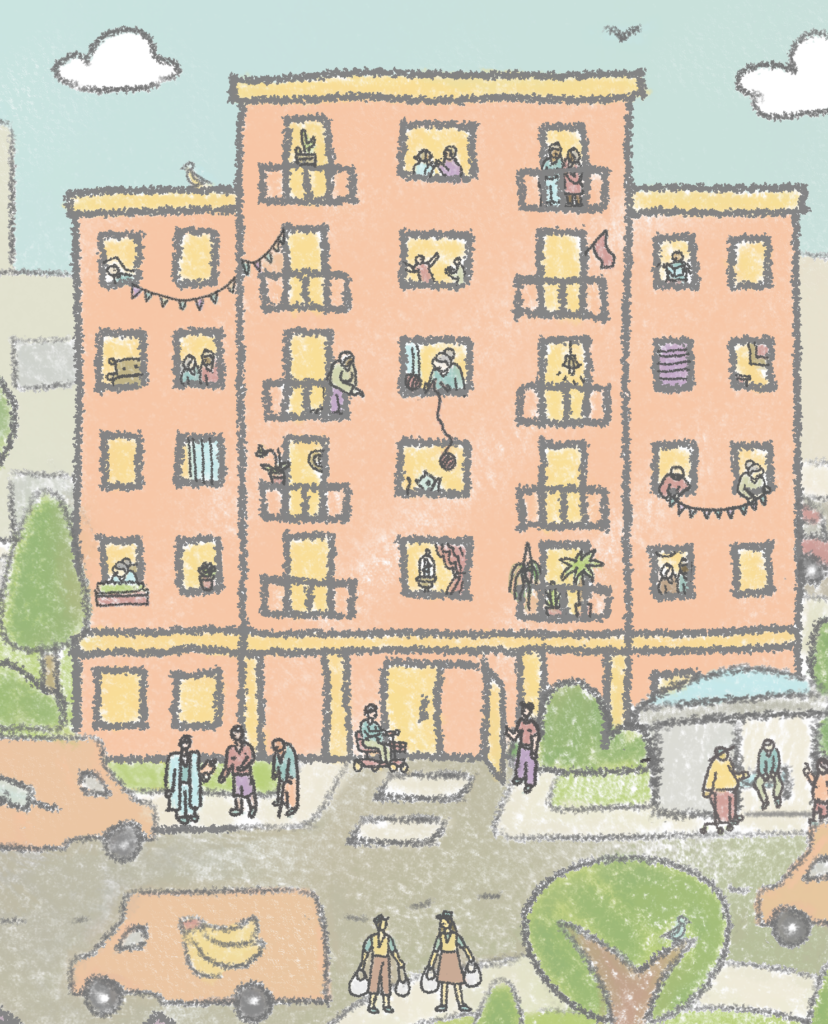As an only child and “Daddy’s girl,” Andrea’s life was upended when her father was diagnosed in 2015 with Parkinson’s, a degenerative disease typically characterized by involuntary movements, declining mobility and, sometimes, dementia, and often resulting in increasing dependency and long-term care.
At the time, Andrea had been working in the U.S. for five years, advancing her career in the tech industry, and was newly married to Mark. Initially after her father’s diagnosis, Andrea recalls a phase of “low impact,” in which her father continued to work and drive independently, with only minor tremors and stiffness. Over the three years to follow, however, it became increasingly challenging for Andrea to be involved in her father’s care from a distance.
Her close friend, Mike, recounts: “When Parkinson’s was newer to her family … it was like, every long weekend, flying back (to Toronto to take care of) all the doctor stuff lined up over the next 48 hours, 72 hours, and then fly back.”
After a fall in 2018, Andrea’s father retired and stopped driving, events that triggered Andrea to move with Mark back to the Toronto area within the year. They were intent on optimizing the quality of life, safety and comfort for her parents and Andrea was ready to quarterback plans to make “Togethering” a reality for their small family of four.
Their first year back, Andrea and Mark lived in downtown Toronto while her parents stayed in their “well-sized” suburban Oakville home. At this time, Andrea needed to figure out a plan of where and how to merge the couple’s lives with her parents’. Initially, she entertained moving them all to Niagara, Collingwood or Prince Edward County, but with her father’s trusted, 20-year long-care team in the Toronto area, this was impractical. As importantly, she realized that pulling her parents away from their established social network in the GTA may do more harm than good.
Starting their house hunt raised several possibilities. First, there was the need to balance her parent’s autonomy with providing them help. Initially, two condos in the same building seemed like the way to go. But recalling an incident in which her parents chose to eat in the dark instead of asking for help to replace a lightbulb, Andrea decided they eventually would need a shared dwelling.
Renting a condo or apartment as Andrea’s parents have done offers flexibility, independence and care-free home maintenance
However, a smaller single-family home would come with specific dealbreakers. It would need to have a bedroom for her parents on the main floor, and two independent work spaces for both Andrea and Mark, two work-from-home professionals.
A larger home with more physical separation, however, also had its issues. While it would afford the two couples more privacy, Andrea and Mark might miss her father’s calls for help, especially with his weakened voice. It already had happened once before, when he had fallen in his Oakville house and everyone was sleeping.
In 2021, Andrea and Mark purchased a mid-sized home in a walkable Mississauga neighbourhood, with easy access to public transit, grocery stores, pharmacy and a community centre. The master bedroom on the main floor and large spaces on the second floor and basement had ample live/work space for her and Mark.
Andrea has spent the past year incrementally warming her mother up to the idea of moving in. Although Andrea had been discussing eventual co-living with her parents since her father’s diagnosis, purchasing their new home was still met with her mother’s protests.
“(Mom) was very vocal … that she would not be moving in with us … that she was happy where she was,” Andrea says.
Andrea says she tries to be understanding of her healthy, recently retired and “ferociously independent” mother. Yet, Andrea’s way of providing both parents with the happiest possible retirement involves co-living so her mother doesn’t have to support her father single-handedly.
Rallying her mother’s buy-in has involved hosting her parents for weekend “sleepovers” to help them acclimate to the neighbourhood and walkable amenities. When her mother complains about features of the house, Andrea responds by encouraging her to take over interior design choices.
“I think that’s going to help her feel more at home,” Andrea says, “and that’s going to help her feel like she has more ownership in the home.”
One unexpected aspect of her mother’s resistance has turned out to be Andrea’s relatively smaller house within a gentrifying neighbourhood.
“I think I perhaps underestimated how much that weighs on (Mom’s) decision,” Andrea admits. “I think if we had bought … in a nicer neighborhood, that would have been more motivational for her but … it would be super hard to find … in a walkable neighborhood in our budget.”
In February, with her father’s health declining significantly, Andrea accelerated her co-living plan, “essentially forcing” her parents to sell their Oakville house.
Andrea’s vision of co-living with her parents would allow everyone to take care of each other – future kids or dog included!
At a minimum, Andrea wanted her parents to move closer to be able to support her father’s daily exercise regimen and boost their social interaction. With the trust of her father, she quarterbacked the sale of the family home from start to finish, despite her mother’s continued protests. Selling their home created the “one-way door” to her parents moving into Andrea’s house or neighbourhood. She was able to “funnel” her mother into this decision by helping her parents visualize a better future – without a large home to maintain and greater financial freedom, they could now vacation, visit relatives abroad and enjoy their retirement.
Andrea continues negotiating options with her parents. The compromise thus far has been to move her parents into a rental condo near her Mississauga house. This way, they could gradually acclimate to the neighbourhood but still maintain their autonomy.
In concept, Andrea says purchasing a condo would have been a better financial investment. But renting a nearby unit for her parents would allow a smoother transition should their health or life circumstances change quickly.
Renting would be a “two-way door” option. “(By renting) we have flexibility to change it up if we need to like next year or the year after,” Andrea says. “I don’t know that that’s the most financially savvy route … but I think for us right now, we’re trying to index on flexibility.”
Clearly, the process of Togethering has allowed Andrea to learn on the job to plan, anticipate, respond and adapt to change. Living locally has allowed her to learn her father’s individualized needs and how best to support him day-to-day. She recognizes her blessings of having close relationships with both parents, a fully supportive partner, the means to purchase property in the Toronto area and maintain a work-from-home career.
On her sometimes tumultuous relationship with her mother, Andrea says this has been the most rewarding part of her journey. She calls it “managing polarities.” She has learned to frequently shift from a “heads down” focus on immediate practical changes (e.g., house sale, condo lease), to a long view of an enjoyable shared future.
She knows that, at any moment, things could take a turn, which means pivoting is part of the plan.
“Our lives are not going to be the same (in five years) as they are today,” Andrea says. “And that could mean anything from my dad’s health really deteriorating and maybe we need someone who is almost live-in to (help us support Dad). It could (also) mean anything from Mark and I, you know, having kids or getting a dog …” she laughs.
“Parkinson’s is a degenerative disease, which means the best you can hope for is stability. It can be very easy to get depressed about what the future will look like for (my Dad) … but also thinking there’s very much a reality of him not being around at some point. So it’s about not letting it overwhelm or diminish the joy that we could have today.”
Artwork by Winsome Adelia Tse
Illustration: Communities that offer close proximity to essentials such as groceries, pharmacy, and healthcare allow seniors to age independently in their own neighbourhoods.




The comments section is closed.